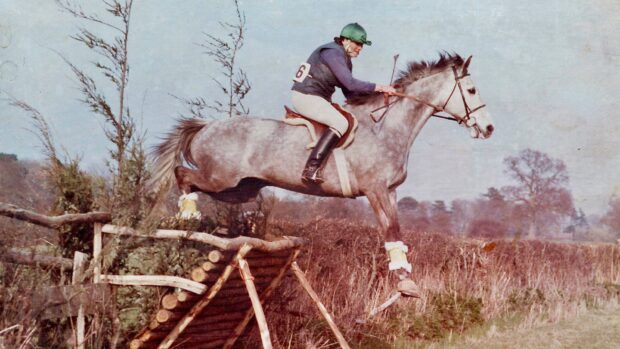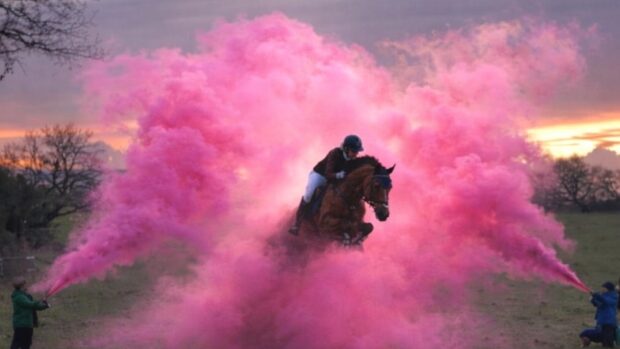Mentors, role models, heroes — those who inspire us help shape us and the truth is, we don’t ever grow out of needing people to look up to. Life would be dull if we did. It’s what connects us, makes us human, means we care, pushes us forwards.
I’ve been thinking a lot over the last two weeks, since Rachael Blackmore’s phenomenal history-making Grand National win, and I’ve been thinking a lot in that time about the importance of role models and heroes — how much crossover there is between those terms, and what the necessary attributes and qualities are and, of course, how gender plays into it.
I’m not trying to earn a living out of competing horses, but inspiration doesn’t work in straight lines, which is part of its beauty. Look at the London 2012 effect on dressage today. The golden boost from our home Olympics means the discipline is thriving at all levels. Give people something — or someone — to aspire towards, and they want to be involved, which can only be a good thing for the sport. Not everyone will be inspired to go and try to win a gold medal, but it’s just as important that people are encouraged and empowered to try something new, take up a new sport they love, discover the magic of that connection with a horse, have fun. That builds a foundation of people who come into an industry for fun or for work, which makes the whole sport richer.
Rachael spoke about wanting to encourage any young person to follow their dreams, and she surely will. The beauty of heroes and role models is that it’s not down to her, or you, or me as to how or who we inspire — that is so completely individual. Does the fact she is a woman, smashing glass ceilings and blazing a trail, matter? Absolutely it does! Does the fact her achievements are huge on their own matter, regardless of her gender? Yes! Be inspired by those who inspire you.
But seeing someone you can relate to achieving greatness does, undoubtedly, play a part in igniting those dreams, especially in a sport that has historically been male dominated.
Retired jockey Lizzie Kelly said it very well when she summed it up recently that when she was little, she was pretending to be AP McCoy, now little girls can pretend to be Rachael Blackmore. Crossing to another sport, Northern Ireland’s most capped football player Julie Nelson said her club has this month been inundated with messages from girls wanting to take up the sport, hours after the team qualified for Euro 2020.
In my own career, there are men and women, older and younger than me, who I look up to, but to me it’s not a decision to be inspired by one or the other. Yet seeing and being supported by women who inspire me and help me see what I could do or what I could achieve, without a doubt helps me aim higher.
Equestrian sport is rightly proud of its status that men and women compete as equals. It should be proud of that and needs to shout about it more, I believe, while recognising it has a way to go in other areas.
I hope moving forward, racing gets to a place where we acknowledge and celebrate achievements of women in sport, but gender is not dominant in the headlines. It’s interesting how two sides of the same coin — racing and equestrian sport — are at different places. It is not a headline in its own right that “woman wins Badminton” or “woman wins Olympic medal”. These are top sportspeople and their achievements are celebrated as such on their own merits, while it also is a result for women in sport.
What is crucial, right now, is that racing and equestrian sport don’t miss this wave of people inspired to get involved, as this is a stellar opportunity for the horse world.
Equal to a point
Equestrian sport, as gender equal as it is in many ways, cannot sit on its laurels. Firstly because nothing good has ever really come from back-patting and not looking forward. Secondly, because it is a wonderful sport and progress is part of its survival. As a sport that is so equal, why is eventing still the odd FEI Olympic discipline out in terms of pausing world ranking points for maternity or illness? These are rankings points, not minimum eligibility requirements, so I can’t see how it is an issue of safety. The FEI managed to rejig its ranking rules for Covid; if it can do it for a once-in-living-memory global pandemic, surely it’s not beyond the realms of possibility for something that happens all over the world, every day.
It’s also interesting to see there is one woman in the top 20 world jumping rankings, yet six in the top 20 under-25s. Why the drop-off? It’s not because they’re not good or tough enough. Being away from home to jump at the shows to build the ranking points to climb the ladder to jump at the shows… it’s a cycle that is tough on any rider, regardless of their gender, particularly those with families and is something I spoke with Holly Smith about at the 2019 European Championships:
“It’s not so much that [women] aren’t tough enough, it’s tough to get the support to put ourselves out there and be away from home so much. It’s not just the riding, you have to be a business person to keep the horses, find the horses and make a living from it,” she said at the time. “You see a lot of women riding at the lower levels, it’s very hard to get the support to push on through. I suppose it depends on each individual, but it also depends on those around them, so massive thanks to everybody around me for encouraging me.”
Can we learn from other countries?
There’s a quirk — not exclusive to racing, but rather to the self-employed — that means it is possible for professional jockeys (and riders) to be paid, through insurance, for time out through illness or injury, but not for having a baby. It is categorically nobody’s decision, other than the mother, as to whether she chooses to return to riding or not and, of course, being pregnant isn’t illness or injury. But it is a reason why someone will be out of the saddle for a time. They’ve managed paid maternity leave for jockeys in Australia and looking at sport as a whole a moment, Sport Ireland now provides maternity pay for carded athletes for up to 12 months. UK Sport’s policy leaves it up to governing bodies to decide how to handle it, so I’m not alleging that our riders on World Class programmes aren’t supported. What I am saying is other countries are progressing in this area and is there anything sport in Britain as a whole could take on board from them?
“It’s always been that way” just doesn’t cut it any more. That’s not the same as tradition. Tradition is a beautiful part of our sport and it is possible to love tradition and to also love progress. I know I do.
- Did you have equestrian heroes as a child, or now; do you agree with Lucy? Email hhletters@futurenet.com for your chance to be featured on our letters page in the magazine. The letter of the week wins a bottle of Champagne Taittinger.
Horse & Hound magazine, out every Thursday, is packed with all the latest news and reports, as well as interviews, specials, nostalgia, vet and training advice. Find how you can enjoy the magazine delivered to your door every week, plus options to upgrade to access our H&H Plus online service which brings you breaking news as it happens as well as other benefits.




